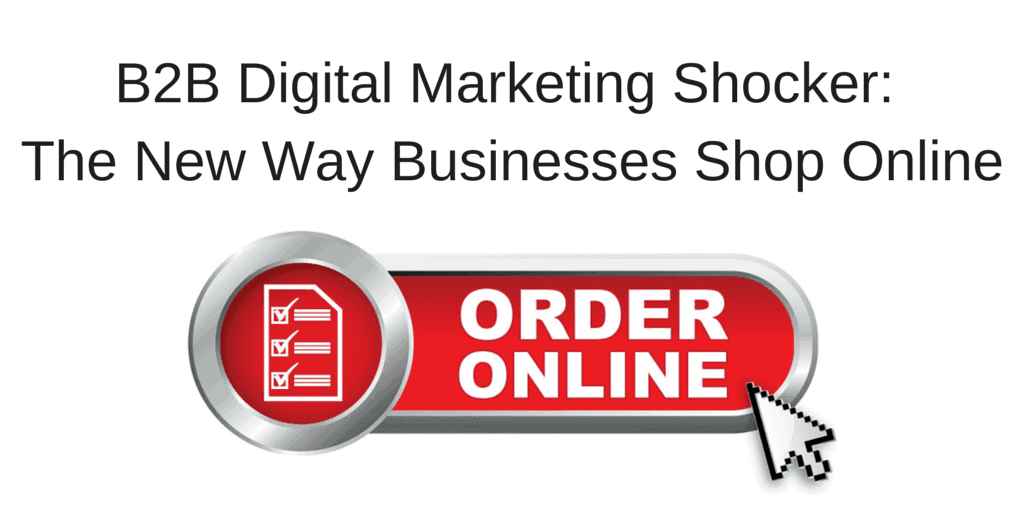It’s common knowledge that the way consumers shop has been dramatically changed by the internet. The ability to research products and services online, comparison shop from the comfort of home, and buy with the click of a mouse – without ever speaking to a salesperson – has forever altered the way we think about and approach shopping.
B2C businesses have adapted to this new reality by embracing online marketing, creating SEO-friendly sites full of engaging content and creating social media and email campaigns to develop relationships with consumers.
But B2B companies have a different audience, and a different approach to sales. Often the infrastructure at B2B businesses is based on that personal relationship between sales reps and the clients whose accounts they service.
While most B2B companies have expanded their online presence dramatically, it is still not the main focus of their sales efforts.
But according to some startling new stats about the way businesses shop, maybe it should be.
A 2014 study done by Acquity Group breaks down the numbers that demonstrate the big changes happening in the B2B market.
First of all, B2B buyers are beginning to be strongly influenced by their own consumer purchasing habits. In 2014, 68% of businesses purchased products online – as opposed to the 57% that did so in 2013. A full 18% of B2B buyers are now spending 90% or more of their budgets online, a figure that is twice as many as in 2013. And 46% of businesses plan to increase their online purchasing in 2015.
If that doesn’t make the case for a stronger B2B focus on digital marketing, then we don’t know what does!
But it doesn’t stop there. A whopping 46% of businesses spend over half their budgets online, while 1/3 of B2B buyers spend between 10% and 50% of their budgets online.
That’s a serious trend, one that should not be taken lightly by any B2B company.
So how can B2B businesses take advantage of this new trend, rather than being hurt by it?
It’s all in the numbers. Even if buying from a real live salesperson, 94% of B2B buyers research that product or service online before making a final decision. But here’s the rub – 83.4% of businesses comparison shop on B2B supplier websites, but only 37% think these B2B company websites are most helpful to their research. 77% of B2B buyers prefer using Google to do their research, rather than company websites, and 40% check review sites to find out what their peers are saying.
What does this mean for online B2B marketing?
First of all, it shows how incredibly important a good, solid website is to producing conversions. If only 37% of businesses find their suppliers’ websites helpful, it’s because those websites have not been filled with useful content businesses can use in their decision-making process. Sure, they probably have basic product information, but what about white papers with side-by-side comparisons demonstrating why their product is better than the competition’s, or a blog sharing the latest industry news, and establishing them as a leader in their field? More businesses would turn to B2B websites if the information they need was there.
Secondly, it tells us that SEO and content marketing must be a vital part of B2B marketing. 77% of businesses use Google to research a product before buying. That means it is absolutely essential that a B2B website be optimized to show up on those B2B buyers’ search results pages. If a company is selling business software, it has to have enough keyword-rich, Google-friendly content on its site and in its internal architecture to pop up on that first page when a business searches for the products they need.
And finally, it demonstrates the importance of online word-of-mouth marketing for B2B businesses. If a full 40% of businesses are looking for reviews and customer testimonials as part of their research, B2B companies should make them easy to find. Including them on their own website is a first step – in video form, or written as case studies. But just as important are the client-company interactions on social media and on those review sites. Social proof should be available on every channel a B2B company utilizes.
It’s clear that a comprehensive digital marketing strategy can no longer be a secondary concern for B2B businesses – it has to become a major focus of their marketing efforts, in order to keep up with the way businesses are now shopping. If you need help making your online presence stronger, contact Zen Media, and put our experience in B2B marketing to work for your business today.









